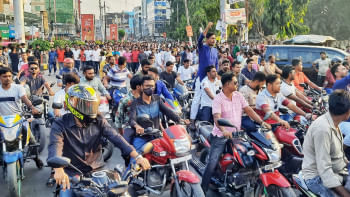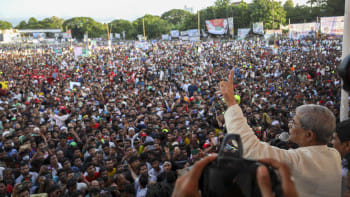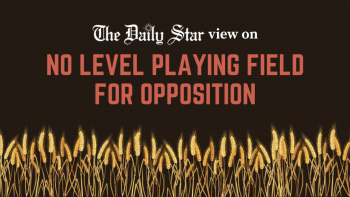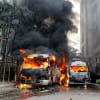Column by Mahfuz Anam: The underlying story of a simple photograph

The lead photograph published in the daily Desh Rupantor on Wednesday was of bamboo sticks for sale, whose demand has suddenly skyrocketed – with opposition political rallies becoming frequent, and violently obstructing them becoming a regular feature. The irony of the caption in Bangla – Rajnaitik Baash – is totally lost in its literal English translation – "Political Bamboos."
As an editor, I commend the photographer, the caption writer, and the news editor for depicting a sad reality with such subtle deftness.
I wish I could confine my feeling to just admiring the photograph and detach myself from the sad, and potentially dangerous, political story that those bamboo sticks tell. From the ruling party, the writing on the wall is that violence will be used to stop opposition rallies, and the message from the opposition is that it will be countered with equal force. The net result is rising political violence and the consequent vitiation of the atmosphere of freedom of assembly and free speech.
Every time the BNP called a meeting somewhere, almost like magic the local transport workers discovered issues to call a strike for. Mass presence in the Chattogram rally may have triggered this tactic. We saw transport strikes centred around BNP meetings in Mymensingh, Khulna, Rangpur, and Barishal. At first it covered only buses, then it included CNG auto-rickshaws, then battery-driven rickshaws, and so on.
In Barishal, where water transport constitutes a vital means of travelling, launch owners and drivers – usually at loggerheads – found some common cause to call a strike for. As if the coincidences of calling for transport strikes wherever BNP called for rallies were not enough, the magic showed greater power when those strikes were called off within hours – if not minutes – of the said rallies ending, without a single issue (for which the strike was originally called) even remotely addressed. BNP's Faridpur rally is supposed to be held tomorrow. The bus-minibus owners' association in Faridpur has already announced a strike from 6am today till 8pm tomorrow.
And all the while, Awami League's Obaidul Quader repeated ad infinitum that the strikes were the acts of the respective unions and had no connection with the ruling party. So much for his respect for our common sense.
Those of us who had some exposure to mass demonstrations and know the psyche of protesters from our student days – and Awami League leaders have had plenty of such experience in the 50s and 60s against the Pakistanis, in the 80s in the anti-Ershad movement, and in the early 90s and in 2001-2006 against Khaleda Zia's government – know very well that the bigger the obstacles, the greater the determination of the activists to implement their programme. In our own student days, we would wait for the government to take obstructive measures; most often, it was the promulgation of Section 144, which prohibited gatherings and even walking on the streets in groups of more than five. It did nothing to dampen our spirit.
It is our belief that, had the Awami League not put up these obstacles, the gatherings might well have been less, and definitely not so defiant. In Barishal, we saw people arriving days in advance and sleeping under trees and eating only puffed rice just to attend the meeting. Such devotion is a dream come true for the BNP, and something that they have been craving for all these past years. Thanks to the ruling party, they have now got it.
Moves like engineered transport strikes end up affecting the general public – who have nothing to do with politics and are not BNP supporters – and bring them into the fray because of their angry reactions towards their sufferings due to the strikes. They hold the government and the ruling party responsible and end up joining the protest.
In this regard, nothing could have sounded more farcical than the home minister's warning of police action if public suffering is caused by the BNP's proposed rally on December 10. Well, are the Dhakaites not witness to the city being almost paralysed when any major rallies are held by Chhatra League, Jubo League, other leagues, and by the Awami League itself? Public suffering, which is clearly evident and plentifully reported by the media, is not an issue then.
In judging our particular situation, we were made aware by our prime minister lately that Bangladesh was a part of the "Global Village" and, as such, we suffered from the same afflictions as the rest of the world. She is right. Just as we prosper when the world economy thrives, so we must also suffer when the situation reverses.
However, if we are a part of the Global Village in the economic sense, shouldn't we also be a part of that same Village in other senses – democracy, justice, accountability, respect for law, rights, freedom of speech, assembly and of the media, and whatever else the Global Village represents? Why must we only share its sufferings and not its benefits?
Why should voting – which many say cannot be banked on any more – every five years be our definition of democracy? What about the accountability of our public representatives? There is no way of knowing how the development allocations, which the MPs get for our benefit, is spent. What about the accountability of public servants whose salaries, perks, pensions – all of which have increased many-fold and which we pay for through taxes? Through political patronage, nowadays they are more the masters of the public than their servants. Have any of the project directors ever been held accountable for the endless delays and continuous budget revisions of projects that end up costing thousands of crores more to the taxpayers? What about the responsibility of their respective secretaries and line ministers?
We sometimes hear that the prime minister has expressed her displeasure about the said delays, but nothing about the officials being held responsible and punished. Accountability is a sine qua non in the governments of the Global Village that our prime minister has referred to and, as its part, we must have it too – not only their inflation, oil price rise, etc.
Coming back to the photo of bamboo sticks, it symbolises the unlawful use of power, which in its varied forms – political, financial, and physical – is how we are running our affairs. The current rise of political violence, against which the United Nations has expressed concern very recently, may become more acute as the general election nears.
The question that is deep in our hearts and remains only silently articulated is: will the election be free and fair or will the bamboo sticks have the last say?
Mahfuz Anam is the editor and publisher of The Daily Star.

 For all latest news, follow The Daily Star's Google News channel.
For all latest news, follow The Daily Star's Google News channel. 













Comments